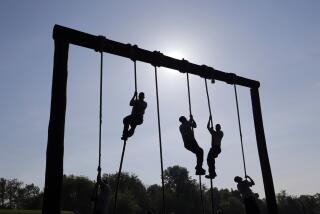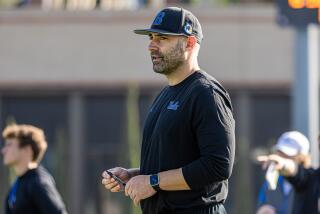Chaump Is Determined to Revive Navy
- Share via
ANNAPOLIS, Md. — Taking a brief break from his task of reviving Navy football--a chore he has devoted most of his energy to the past seven months--Coach George Chaump recently reflected on life at Marshall University.
“Every place I’d go in Huntington (W.Va.), I was known,” said Chaump, who coached the Thundering Herd for four years before taking the Navy job. “No one asked me how to spell my name. Nobody asked for verification to cash a check. No one questioned anything.
“People there had what they called ‘Green Fever’ -- they bled green. Football there was big.”
Here, Chaump shouldn’t have to worry about being approached by strangers who bleed Navy blue blood. Navy football, to some, is about as big as curling.
None of which phases Chaump. Hired to revive a struggling program, Chaump said he realizes that winning is the only way he’ll get a following. And he plans to win now, not later, starting with the season opener on Sept. 8 against Richmond.
“I’m not talking about rebuilding. We’re going to go on from here,” said Chaump, sitting in his office, which is virtually unchanged from the days of his predecessor, Elliot Uzelac. “And I don’t plan on having a losing season. I don’t care how bad things are.”
“Bad” for Navy has meant seven straight years of losing football, with the best record in that span 4-6-1 in 1984. Enter Chaump, who has had one losing season in eight years of college coaching (57-32-2) and has a reputation for winning with a crowd-pleasing style.
“I just have one piece of advice for Navy fans -- they better be in their seats before the game starts,” said Mike Carey, president of Marshall’s Quarterback Club. “George has an exciting brand of football. And he always does something exciting on the first play.”
The Navy brass is waiting for the excitement to start.
“He and his staff are doing an excellent job,” said Jack Lengyel, Navy’s athletic director. “I’m very impressed with what I’ve seen. Morale is high, and everyone is looking forward to the start of the season.”
Tempering the excitement are everyone except, surprisingly, Chaump. At the start of fall camp, Chaump and his assistants were looking forward to whipping the team into shape for the opener. But since then injuries that have sidelined several projected starters. Offensive tackle Michael Davis (knee problems) and tailback Ivan Bullard (pulled stomach muscle) are out for four weeks, offensive guard Carl Voss (back surgery) will miss the season, and linebacker Beau Laskey (shoulder problems) is out indefinitely. Those injuries, and others, have quelled some of that exuberance Chaump felt.
“After spring ball, I was hoping to get some offensive linemen back, but with losing two starters and being thin to begin with, I’m a little concerned,” said the soft-spoken Chaump, an exasperated look on his face. “We need more time. I dread the thought of playing Virginia (Sept. 15) so early in the football season. If you want my opinion, the home opener is coming too soon.”
And when would he like to open?
“How about December?” he said, laughing. “We don’t have too much depth, and with the injuries, it’s slowing us down. I never considered this many problems with injuries. It’s just a bad rash at a time we need players in practice to learn the system.”
Chaump’s system probably played a big part in his getting the Navy job. He favors a high-powered offense -- i.e. “passing”-- that should pull fans out of the doldrums they sank in watching the “run, run, run” which should please fans more than the running game that eventually ran Uzelac out of Annapolis.
The players, apparently, also were in a funk. Looking back at spring practice, Chaump remembers a team that was “floundering and grasping” and lacking “a sense of unity.” Now, he says, that has changed.
“Seven years without a winning record, you’re going to flounder, you’re going to grasp, you’re going to doubt,” Chaump said. “But by the end, I sensed there was the development of pride, team unity, emotion and excitement. The team started believing in themselves, and believing in their teammates. They seemed very, very confident.”
Just like their ever-confident coach, who said his passing attack will work even though similar schools -- Army, Air Force and The Citadel -- use the run-oriented wishbone because of their inability to attract top-notch quarterbacks or big offensive linemen.
“I’ve heard all the arguments, in addition to the fact that the wishbone is a ball-control offense that controls the clock, which keeps your defense off the field,” Chaump said. “I think there’s truth to all of this, but I don’t necessarily buy it. If I didn’t think we could win with the more wide-open attack, I certainly wouldn’t have gone with it.”
There’s no arguing with Chaump’s success. In his first head coaching job, John Harris High School in Harrisburg, Pa., went 58-4 in six years, including four unbeaten seasons. He next spent 11 years as quarterback coach at Ohio State under Woody Hayes, coaching such players as Cornelius Green and Art Schlichter. Ohio State went 95-15-3 while Chaump was there.
After that came the Tampa Bay Buccaneers in the National Football League, where Chaump coached the offensive backfield -- including quarterback Doug Williams -- for three seasons under John McKay, when the team won its only two NFC Central Division titles.
Chaump became a college head coach in 1982, leading Indiana (Pa.) University to a 24-16-1 record in four years. At Marshall, his four-year record was 33-16-1, including a berth in the 1987 Division I-AA final.
With a record of winning at all levels (Indiana went 4-6 his first year, his only losing season), Chaump said he doesn’t see why he can’t win in Division I-A with Navy.
“I have a better feeling here then I had anywhere else, based on what I’ve seen the kids can do,” Chaump said. “But there’s a Catch-22 there because we play tougher people. But that’s irrelevant.
“As far as differences in my approach to coaching, I’ve coached all levels -- even my daughter’s softball teams -- and the drive to win is just about the same. There’s no difference in the way I coach. When we played a championship game in girls softball, I had the same sleepless night and nervous morning before the game as I have now.”
Although Navy hasn’t had a winning season since 1982 -- and has had just six in the past 22 -- Chaump said he feels no pressure from Navy backers.
“The only pressure I feel is pressure I put on myself to prove we can win,” Chaump said. “I get the feeling the people here just want a class operation. And even though they’d like to win, if things are going well and the football is entertaining and they could be proud of their team, they’d be happy.
“But I don’t feel that way. I want to go out and win. I want to be a football team that’s respected, a football team that’s a class act. I think if we take care of those things, the wins will take care of themselves.”
With winning comes support. Chaump is hoping that enthusiasm at Navy will soon rival that at Marshall.
“After losing for so long, it’s almost like it’s in a dormant state here,” Chaump said. “Even the people who have a strong feeling for the Navy, they have been turned off because of losing.
“What we want to do is get the brigade excited about football. Then we’ll try to get local interest, statewide interest, and then get Navy recognized on a national level. This year, we hope to get the brigade excited, and if we go any farther, it’ll be a plus. It’s going to take some time, but we plan to do it.”
More to Read
Get our high school sports newsletter
Prep Rally is devoted to the SoCal high school sports experience, bringing you scores, stories and a behind-the-scenes look at what makes prep sports so popular.
You may occasionally receive promotional content from the Los Angeles Times.






